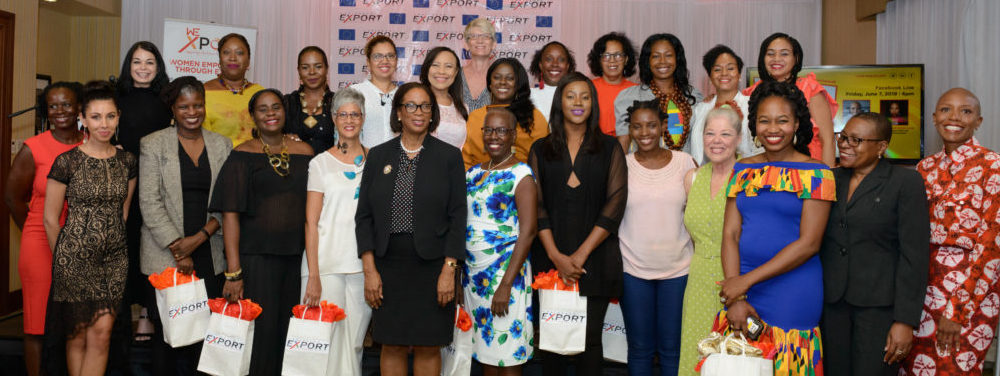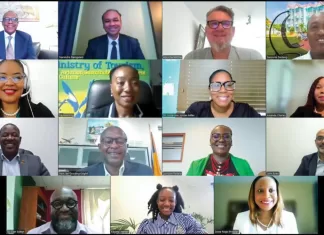Nineteen Caribbean female entrepreneurs have successfully completed the WE-Xport Programme, an initiative geared at helping them to start exporting or to increase exports of their products and services.
Organized by the Caribbean Export Development Agency (Caribbean Export) in cooperation with the European Union, WE-Xport commenced in March 2018 and climaxed with a closing ceremony on Friday, June 7, 2019, at the Hilton Barbados Resort.
“We believe that this WE-Xport programme has been a tremendous success,” Mr. Zamani Moodie, Market Intelligence Advisor at Caribbean Export said on behalf of Ms. Cecile Humphrey, Chairperson of the Board of the Directors.
“Caribbean Export understands the complexed challenges faced by regional firms, particularly those owned by women.” A study by the Women’s Entrepreneurial Venture Scope, funded by the Multilateral Investment Fund on doing business, ranks many Caribbean countries at the bottom of the list for female entrepreneurship.
“Access to finance and women’s business skill capacity are identified amongst the reasons for this low ranking. Against this backdrop, the Caribbean Export Development Agency developed a special programme called WE-Xport to assist women entrepreneurs in the region,” he explained.
In addition, a study by infoDev, (“Profiling Caribbean Women Entrepreneurs: Business Environment, Sectoral Constraints and Programming Lessons”) draws attention to the state of women-owned businesses in the Caribbean. The study shows that these businesses have little to no employees, are concentrated in low growth sectors and have difficulty accessing finance. Other challenges are their lack of self-confidence and women’s fear of failure in their businesses. Women also struggle with work life balance because many are primary caregivers.
Mr. Moodie further outlined that the objectives of WE-Xport were to build capacity amongst women-owned enterprises as well as to access alternative sources of funding. It also aimed to provide capacity building tools to help the entrepreneurs improve their international competitiveness and increase penetration in new markets.
Additionally, the WE-Xport programme sought to advocate for the empowerment of female entrepreneurs by strengthening their network and by creating awareness amongst business support organizations, development partners and stakeholders.
Over the year participants benefited from technical assistance, finance workshops, online business training, a personal business coach and access to grant funding.
The entrepreneurs had the opportunity to showcase their products and services to regional and international buyers at a Buyers’ Programme organized by the Barbados Investment and Development Corporation and the Caribbean Export. They also got the chance to sell and display goods at BMEX, Barbados’ largest manufacturing expo.
“We hope that you had a rewarding experience and had obtain tangible benefits that you will continue to use to enhance the competitiveness of your businesses. We wish tremendous success to you,” Mr. Moodie said.
He also thanked the European Union (EU), the Caribbean Development Bank, the German International Corporation and UN Women for partnering with Caribbean Export on the programme.
Ms. Celine Anselme, Programme Manager in the delegation of the EU to Barbados, the Eastern Caribbean, the OECS and CARICOM/CARIFORUM, described WE-Xport as “innovative”.
Noting that the EU supported the important role that private sector played in generating employment and economic growth within the region, she said the EU had been working with Caribbean Export for approximately 20 years.
She added that since 2017 the EU had been running a US $30 million private sector development programme which is being implemented by Caribbean Export. It will end in 2021.
“WE-Xport is one of the many successful activities being implemented. WE-Xport is not just any initiative, it is innovative. It is the first women only initiative designed within Caribbean Export to enhance the export capacities of women-owned enterprises.
“WE-Xport got off the ground for two critical reasons. The first was a need to address the fact that women-owned enterprises in the Caribbean are concentrated in saturated sectors thereby making them difficult to grow. Second, research has shown that in the Caribbean, women’s participation in self-employment is lower than their male counterparts, and when self-employed, women are more likely to operate at the micro level with sometimes no employees,” she explained.
Ms. Anselme said the EU regarded women’s empowerment as a matter of human rights, democracy and good governance and argued that it makes good economic sense.
“Women normally control the house provisions and the financial decisions for their families and by extension, women are a significant pool of consumers and clients.”
Minister in the Ministry of Foreign Trade in Barbados, Sandra Husbands told the WE-Xport entrepreneurs that they played an important role in transforming their countries’ economies.
“The Gross Domestic Product (GDP) of your country needs you. While you may think your business is small, while you may think you are struggling… every single penny that you turn over in your business contributes to the GDP of your country. Therefore, what you do every day is not only important to you and your family, it is important to your country.”
Minister Husbands told participants it was critical to look beyond their country to achieve true growth and pointed out that the Barbadian government was encouraging the local business community to explore markets in Guyana, Suriname and Panama.
Taribba do Nacimento from St. Lucia, who owns the designer handmade bag company, Meme Bete, said the WE-Xport programme was very beneficial.
“St. Lucia has a population of 180,000 people, if I do not export my business cannot survive. I am not selling fish, I am not selling food. There are so only many handbags a local lady can and will buy.
“I am not selling a need, I am selling a want in an affordable luxury market with lots competition. The WE-Xport programme allowed me to finally set up my website. I was grateful to have a business coach who worked in fashion and understood the industry,” Ms. do Nacimento said.
Mrs. Grace Foster-Reid, owner of EcoFarms in Jamaica, an enterprise which produces organic honey and a range of honey by-products, also praised the WE-Xport Programme. Through the initiative, she secured a deal to supply honey to the international coffee franchise Starbucks.
She thanked her coach for helping her “to take the Starbucks order from 95 per cent to 100 per cent”. However, she said the highlight of her experience was forming a sisterhood with the other women.
“I thought I was coming for information about financing and mentorship, but the relations were fabulous. Immediately I felt like I was with sisters. Entrepreneurship is a lonely place. On Friday evening, everybody is worried about how to pay their workers. Right away I had a family, women with whom I could share and be vulnerable with.”
Observing they were the first group to participate in the initiative she appealed to Caribbean Export to continue the WE-Xport programme given the benefits derived.“This should not be the last experience, there are many other women in the Caribbean who could benefit from this,” Mrs. Foster-Reid emphasized. (Shamkoe Pilé/Caribbean Export)





